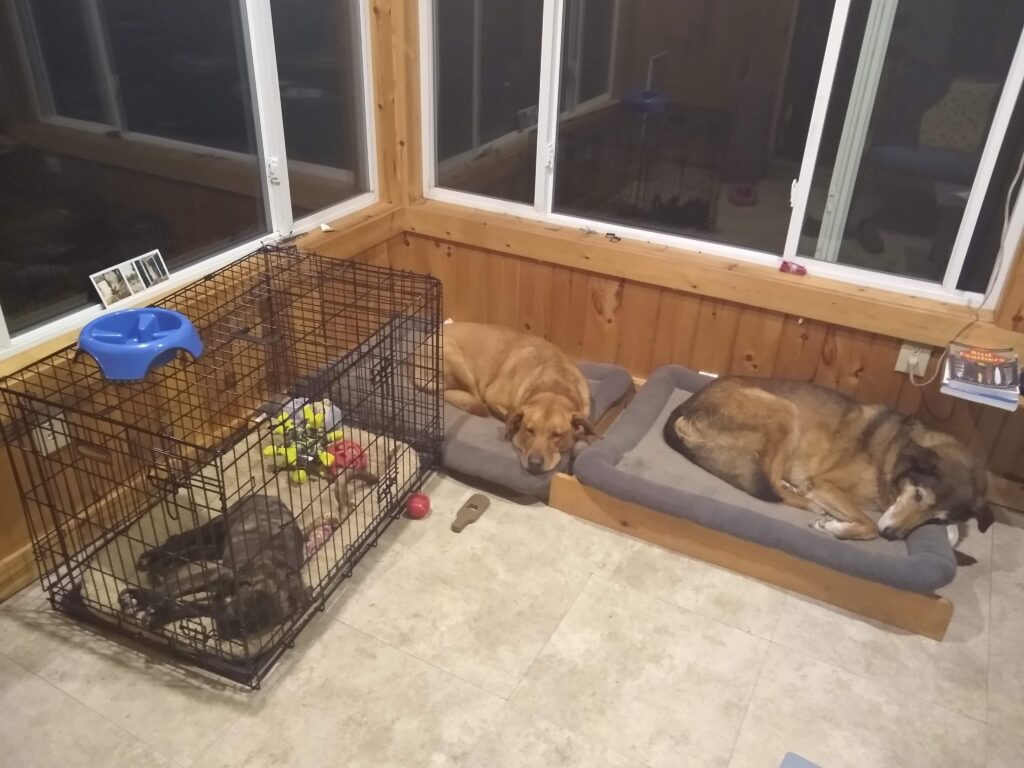Lessons from the Pack

Amid the craziness of COVID-19 and the eerily close election 2020, the turning of the seasons offers a reminder that there are no constants. As I sit listening through the open window to the sounds of insects—revived by a day of warmth—I am watching our three dogs, Mars, Winnie, and Æsc (Ash), our newest rescue pup, settled peacefully on their beds, side-by-side in the corner of the sunroom.
There is an unsettling that comes with encroaching change that compels us all to seek equilibrium. Like many people, we have chosen this time of uncertainty and confinement to adopt some new family members: first our recent feline find, “Cat Stevens”—who became the topic for last month’s “Light Lens”—and now Æsc.
The moment of quiet bliss as they rest peacefully tells just part of the story of their, and our, careful negotiation of personalities and relationship-building. Overall, it has been a satisfactory transition, albeit not without some clear boundary setting to let all, especially Æsc, know where things stand. Winnie and the “wee one” have established a playful pattern of canine interactions. Mars—our senior dog who is slowing down—has, after an initial friendly welcome that rivaled Winnie’s (she initially wanted nothing but our love, and nothing to do with that thing) now stands ringside as they play, monitoring their bouts like a cantankerous referee.
“Cat Stevens” (housed happily in a separate building) remains free of the fray; some relationships are too challenging to negotiate.
A friend of my son, after seeing a posted video of Winnie and Æsc playing, responded, “Dogs do not deserve us.” This got me to thinking about the differences between human and canine patterns of rivalry and acceptance. With the recent sad loss of Justice Ruth Bader Ginsburg there is a renewed battle for dominance—a rising conflict that threatens to overshadow rather than celebrate her legacy. The escalating fervor, and growing sense of unease, leaves me wondering if the differences might best be decided in a more straightforward manner—perhaps a gentlemanly-like duel, or maybe a more civilized settling of leadership—such as a friendly bout of chess.
So often, we get caught up in a taking of sides (an oversimplification, at best, of our unique principles, passions, and understandings; a denial of who we are as individuals) and in doing so fail to adapt the kind of give-and-take required to find common ground. Canine negotiations are tied instinctually to survival; not everyone who comes along will equally benefit the future wellbeing of the pack; not everyone is chosen, and the loser accepts this and quietly walks away.
As the election looms (election day simply cannot come soon enough) it seems prudent to reflect on what dogs do well. They are not deliberately mean. They are welcoming and responsive to the moods and needs of others, even those that might not have shown them the same. They are accepting of differences and welcome diversity. They recognize those who came before. They understand the concept of give-and-take. They will (despite differences of opinion and criticism) find ways of sharing communally, working things out for the betterment of all.
As we move through the exigent demands of co-puppy rearing, we are welcoming the distraction our decision to add Æsc to our family has imposed. We had moved forward with intent, planning for the challenges and talking through (remember that?) how best to support the existing guard while integrating in the new. We had the pups meet first on neutral ground, well away from the home that the older pups “owned.” We took it slow, starting with just a quick, friendly sniff followed by increased, friendly, interaction. We allowed the adult dogs to stake their claims while safeguarding the newcomer. We wanted more than meek acceptance of dominance; we wanted to forge solid relationships beneficial to all.
D.E. Bentley
Editor, Owl Light News